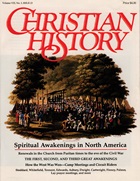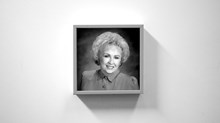When John Wesley made his famous statement “the world is my parish,” he surely was including the New World. However, America turned out to be a far more fruitful Methodist mission field than he ever anticipated.
In 1771 the annual Methodist Conference met in Bristol, England. During the meetings, John Wesley arose and solemnly remarked, “Our brethren in America call aloud for help. Who are willing to go over and help them?” Among those who responded was a young man who would contribute more to the success and spread of Methodism in America than any other person: Francis Asbury.
Asbury was born in Birmingham in 1745. He was able to obtain only a few years of formal education. As a youth he was converted to Christ, and took every opportunity to hear the traveling Methodist preachers. At the age of 22 he was confirmed as a lay preacher himself.
When he answered the call for preachers to go to America, some looked on his decision as a reckless enterprise, but he was determined to go, and he never returned to England. Not long after he recorded in his diary:
October 27. This day we landed in Philadelphia.… When I came near the American shore, my very heart melted within me, to think from whence I came, where I was going, and what I was going about. But I felt my mind open to the people, and my tongue loosed to speak. I feel that God is here.…
In October 1772 Asbury was placed in charge of the Methodist congregations and preachers of America. He soon realized that the Methodist practice of using traveling preachers would be even more practical in America than in England. American congregations were small and separated by large distances, and establishing settled pastors was almost impossible. The plan of using “circuit riders,” Asbury believed, would be most useful in the rural areas of the new country.
War and Change
Wesley became unpopular in the colonies when he openly disagreed with the call for independence. He never again regained control over American Methodism. When the Revolution broke out, with the exception of Asbury, the Methodist leadership in the Colonies returned to England. This departure of the English preachers, it was commonly thought, was a disaster for the Methodists. During the war years, as a Methodist chapel was being erected in Delaware, one onlooker remarked: “It’s no use putting up so large a dwelling for Methodists, for after the war a corncrib will hold them all.”
However, the departure of the English was a good thing for the movement, because it brought to the front native American leaders. It also was a fortunate stroke for Asbury, who had supported the colonists in their cause.
Frontier Christianity
In the later 1700s, life was extremely difficult and dangerous on rural farms and on the Western frontier areas. There were no luxuries and few comforts, and few opportunities for social and cultural contacts. Indians and outlaws presented a real threat. Sometimes a month or two passed before a settler would see anyone except the members of his immediate family. The arrival of a visitor was an event of great importance, for it would bring news of the outside world.
A traveling preacher was a welcome break in the depressing routine, and might draw crowds from miles around. He would perform marriages, baptize infants, serve Communion, and his preaching would allow many to feel that God had not forgotten them.
In the decade before the Revolution, widespread indifference toward religion was growing throughout the colonies. On the frontier, it was feared, lack of interest in religion would develop into open atheism. When people moved into new, unchurched areas with no minister, they might revert to “barbarism” and thus destroy the moral order of society. This fear prevailed for decades in the 1800s, and brought urgent calls to evangelize the settlers. Under Asbury’s direction, a system of traveling preachers became the exact answer to this problem.
Preaching the Circuit
The first reason for the incredibly rapid spread and growth of Methodism in America was the circuit system, which Wesley had developed in England.
Asbury began to direct his traveling preachers as a general moves his troops. He built up a small army of truly courageous men, largely unlearned, but well fitted for their job. Their enthusiasm and disregard of hardship became famous.
The second major factor accounting for the wide acceptance of Methodism was its theology. On the frontier what was preached was straight and simple, and it placed a big responsibility on the listeners to respond to the message immediately. This message was usually coupled with strict rules concerning moral issues, including prohibitions against slaveholding and liquor.
The third major factor in the spread of Methodism was the camp meeting, which Asbury greatly favored and promoted. Camp meetings were gatherings of people in the wilds to hear evangelistic preaching. Large crowds would travel distances and set up tents for housing. More than 20,000 people could be effectively reached at once, and they would attend eagerly. In addition, camp meetings required few preparations, as the preachers simply sent out the notice that one would be held at the stated time and place. Asbury wrote of them, “I pray to God that there may be a score of camp-meetings a week, and wonderful seasons of the Lord in all directions.… I rejoice to think there will be perhaps four or five hundred camp meetings this year.” In Tennessee in October 1800 he gave a vivid description of such a meeting:
… The ministers of God, Methodists and Presbyterians, united their labors and mingled with the childlike simplicity of primitive times. Fires blazing here and there dispelled the darkness and the shouts of the redeemed captives, and the cries of precious souls struggling into life, broke the silence of midnight.…
The stern demands Asbury placed upon himself and his preachers produced results. The decade of the 1780s showed spectacular gains: in 1780 there had been 42 preachers and 8,504 members; by 1790 there were 227 preachers, and 45,949 white and 11,862 black members. In 1820, by which time Asbury had died, there were 904 preachers, and 256,881 members.
Awakenings that Followed
The result of this system for moving quickly into new territories and meeting the needs of the people was that awakenings began in numerous areas of the country, particularly in the South, where Methodists early found a most inviting field.
Devereux Jarratt, an Anglican minister in Virginia who cooperated with the Methodists, oversaw awakenings in 1763 and 1776. Eventually he was traveling on a preaching circuit over 500 miles long! He carried on this remarkable ministry almost alone, against the opposition of the entire Anglican clergy. Another awakening began in Virginia in 1787, in a region known for its number of devout Methodists.
Often the Southern revivals were attended with a large amount of emotion, with weeping, shouting, swoonings, fits, even a type of wild behavior called “the jerks.” Emotional releases of such violent types were common. While it has often been said that the preachers encouraged this behavior to heighten the pressures upon the unconverted, historians have not all agreed. While the preachers did not object to hearty shouts during their preaching, they would not as a rule encourage more enthusiastic behavior. Asbury, like Wesley, firmly held that everything should be done decently and in order, and this he demanded of his circuit riders.
Much of the drive for the enormous Methodist growth came from Asbury, who rose every morning at four o’clock, taught himself Latin, Greek, and Hebrew, and made it his rule to read 100 pages of good literature daily. His travels over rough, trackless, and dangerous wilderness, are staggering, especially in view of his illnesses. Beginning in 1798, it was his custom to make a complete circuit of vast distances, reaching from Georgia to Maine, and inland to Indiana.
Asbury never expected sacrifices of others that he wouldn’t make himself. He traveled constantly throughout his lifetime. He never married, and had no home. All that he owned—pathetically little—was in the two saddlebags on his horse.
It is estimated that in Asbury’s lifetime he preached well over 16,000 sermons, ordained more than 4,000 preachers, traveled on horseback or (when he was too old for that) in carriages 270,000 miles, and wore out six faithful horses! Before he died in 1816 he also had become one of the best-known figures in all America.
Copyright © 1989 by the author or Christianity Today/Christian History magazine.
Click here for reprint information on Christian History.

Support Our Work
Subscribe to CT for less than $4.25/month





























